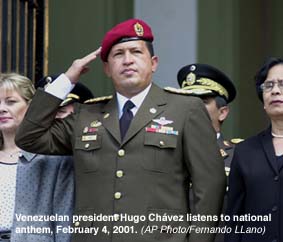New York, June 21, 2001 — In a letter sent today to President Hugo Chávez Frías, the Committee to Protect Journalists (CPJ) expressed alarm about the Venezuelan Supreme Court’s recent decision that issues criteria for “timely, truthful, and impartial information” and specifies how this right may be exercised.
“We are deeply concerned that Venezuelan officials will use the decision as a tool to suppress independent journalism,” said CPJ deputy director Joel Simon.
The highly questionable right to so-called “truthful information” was included in Venezuela’s 1999 Constitution despite strong domestic and international protests. Under the Supreme Court’s ruling of June 12, any journalist can be prosecuted for violating the court-imposed criteria. The Supreme Court asserts, for instance, that the media must avoid spreading “news that is manipulated with the use of half truths.”
Restrictions on expressing opinions
The Court ruling also restricts the ways journalists may express opinions. Among those restrictions are prohibitions on insults that are “out of context, disconnected, or unnecessary for the topic.” The Court also states that a publication might be in violation of the truthful information clause if a majority of its columnists followed the same ideological tendency, unless the publication explicitly claimed that ideology.
Since taking office in February 1999 on the pledge of leading a “peaceful and democratic revolution” to rid the country of poverty and corruption, President Chávez has frequently attacked the media in his lengthy radio and television broadcasts, branding those who disagree with him as “liars” and “counterrevolutionaries.” Both government officials and ordinary Venezuelans seem to have interpreted the president’s verbal fusillades as a license to attack the press. Reporters have been verbally and physically harassed.
In two examples of what Venezuelans have come to label “judicial terrorism,” courts have so blatantly violated due process guarantees that journalists were forced to go into hiding to avoid being arrested and railroaded by the courts.
END
